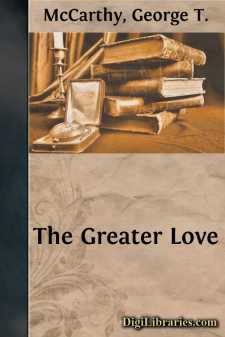Categories
- Antiques & Collectibles 13
- Architecture 36
- Art 48
- Bibles 22
- Biography & Autobiography 813
- Body, Mind & Spirit 141
- Business & Economics 28
- Children's Books 12
- Children's Fiction 9
- Computers 4
- Cooking 94
- Crafts & Hobbies 4
- Drama 346
- Education 46
- Family & Relationships 57
- Fiction 11826
- Games 19
- Gardening 17
- Health & Fitness 34
- History 1377
- House & Home 1
- Humor 147
- Juvenile Fiction 1873
- Juvenile Nonfiction 202
- Language Arts & Disciplines 88
- Law 16
- Literary Collections 686
- Literary Criticism 179
- Mathematics 13
- Medical 41
- Music 40
- Nature 179
- Non-Classifiable 1768
- Performing Arts 7
- Periodicals 1453
- Philosophy 64
- Photography 2
- Poetry 896
- Political Science 203
- Psychology 42
- Reference 154
- Religion 513
- Science 126
- Self-Help 83
- Social Science 81
- Sports & Recreation 34
- Study Aids 3
- Technology & Engineering 59
- Transportation 23
- Travel 463
- True Crime 29
The Greater Love
Categories:
Description:
Excerpt
CHAPTER I
LEAVE HOME—BASE HOSPITAL NO. 11—CAMP DODGE
"Very well then, Father, you have my permission and best wishes."
How the approving words and blessing of good Archbishop Mundelein thrilled me that memorable morning in 1918. The rain-washed freshness of April was abroad in Cass street; and the soft breeze, swaying the curtain of the Chancery window where he was seated, brought incense of budding tree and garden.
Patiently he had listened, while I presented my reasons for wishing to become a war Chaplain. How, obedient to that call to National Service which is
"The pride of each patriot's devotion,"
millions of our boys were exchanging the shelter of home and parish influence for the privation and danger of camp and ship and battlefield.
To accompany them, to encourage them, to administer to their spiritual and moral needs, to fortify their last heroic hours with "Sacramenta propter homines," here was a Christlike work pre-eminently worthy the best traditions of the Priesthood.
Even as, earnestly, I pleaded my case, I bore steadily in mind recollection of that lofty patriotism and brilliant leadership which had already made Chicago's Archbishop a foremost National Champion. It was but yesterday that the Secretary of the United States Treasury had called, personally, to thank and congratulate him on his inspiring patronage of Loan and Red Cross Drives.
In the sympathetic glow of his face I read approval even before hearing the formal words of permission.
"Moreover, Father, I will appoint an administrator at once, to care for the parish during your absence. You will receive, through Father Foley's office, letters duly accrediting you to Bishop Hayes, Chaplain Ordinary, and the National authorities."
A fond ambition, long cherished, was about to be realized! I had, of course, been doing something of a war "bit," co-operating with parishioners, and town folks like Mayor Gibson and Doctor Noble, in the various patriotic rallies and drives. Father Shannon of the "New World" thought so highly of our city's efforts as to visit us and eloquently say so at a monster Mass Meeting of citizens. "Do you know, George," he remarked that night as he marched beside me in the street parade, "if I could only get away, I would gladly go as a Chaplain."
Then I told him my secret, how I had filed my war application some months before, and had been meanwhile seasoning my body to the out-of-doors and practicing long hikes.
But a single cloud now remained in the radiant sky of dreams—the thought of parting! Ten years of residence in so Arcadian a place as Myrtle Avenue, and in so American a town as Harvey, engender ties of affection not easily to be sundered. Then, too, the school children, how one grows to love them, especially when you have given them their first Sacraments, and even joined in wedlock their parents before them. Of course for the priest who, more perhaps than any other man, "has not here a lasting city," whose life is so largely lived for others, and whose "Holy Orders" so naturally merge with marching orders, the leave-taking should not have been so trying....


